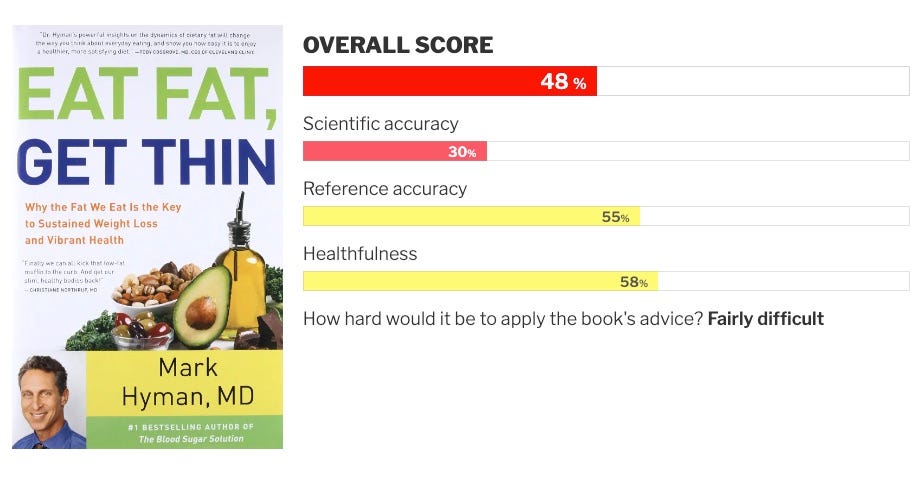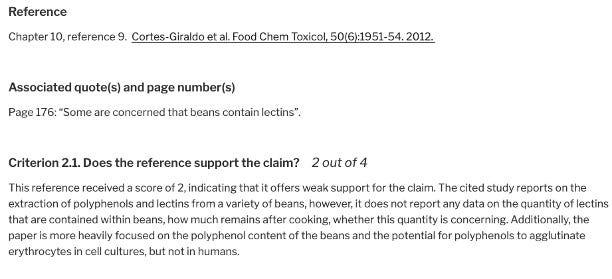Personal Science Week - 240919 Red Pen Reviews
The best source for rigorous health-related book reviews
We read a lot of books on personal health, from the mainstream to the obvious quackery highly-speculative. But life is short, so who has time to skeptically read and fact-check everything?
The people at Red Pen Reviews, that’s who; an average of 40 hours per book, they say. Started in 2016 by nutrition scientist Stephan Guyenet, they use a systematic method for each of their reviews, including a process where they look up ten random references to double-check that the claims are justified. The result is by far the most worthwhile reviews of popular health books that you’ll find.
Understandably, given the effort involved, the site is not updated very often (the most recent review is from Sept 1, 2024). But they try to cover all the most popular books, including many that have been in print for decades. If it’s an influential best-seller or author, you’ll probably find it here.
Each book gets a final overall score that is intended to help guide comparisons so you’ll know, for example, that Walter Willet’s Harvard Medical School Guide (97%) or Justin Sonnenberg’s The Good Gut (86%) are based on better science than David Asprey’s Bulletproof Diet (49%) or Paul Saladino’s Carnivore Code (38%).
For example, here’s a popular book by Mark Hyman (the Chief Medical Officer of Function Health, which we discussed in PSWeek940912). Red Pen breaks its assessment into categories based on the accuracy of its overall science, how well it uses references, and its overall healthfulness.

There is also a helpful bottom line summary if you just want the single takeaway:
The diet and supplement program in Eat Fat, Get Thin may cause weight loss, but it’s expensive and shouldn’t be relied on to reduce the risk of other common diseases like heart disease or cancer.
Personal scientists like to go to the sources wherever possible, and it’s the reference accuracy rating that really shines. The reviewers choose ten random references in the book and do a deep-dive to determine if the citation does indeed say what the book claims.

If you like to read book-length discussions of a health-related topic, you’ll find Red Pen Reviews an invaluable resource. The site is free to read (but please donate if you can) making it one of the best deals on the internet.
Personal Scientist of the Week
Alex Chernavsky has a new site, Self-Experiments.Org, where he tracks his various experiments with caffeine, weight-loss, Soy, and more. We wrote about his potassium experiment in PSWeek240321 (AlexC Potassium Supplementation). Now he’s finished a new one involving reaction time (RT) to see how creatine supplementation might affect his mental acuity. (tldr; probably not)
Other Personal Science Links of Interest
We’re always interested in new types of health data, especially if the labs give normal people access to cutting-edge science.
Theriome is a $750 blood-based test that claims to do “deep molecular profiling” based on an at-home blood test. They analyze 126 metabolites across 68% of the metabolic pathways to give a breakdown of your propensity to a bunch of diseases.
Ideosphere wants to start a new crowdfunding platform for science, similar to the Decentralized Science (#Desci) that we discussed in PSWeek220818. Like us, the creators are fans of alternative funding mechanism for scientists whose ideas are more popular with the public than they are with the scientific gatekeepers at government or venture funding organizations.
Works in Progress published a guide to How to Start an Advanced Market Commitment. The idea is to kickstart research in some speculative area by guaranteeing a certain number of purchase or other upfront commitment. This worked well for Operation Warp Speed, that shipped the COVID vaccine in record time thanks to a government promise to buy the first 900M doses. Could the same ideas apply to personal science funding?
About Personal Science
Professional scientists practice science as part of their job, often investigating ideas or problems with no particular benefit to their daily lives.
Personal Scientists, on the other hand, try to use the principles of science to understand and solve personal problems. Often, these personal investigations relate to health or wellness, but the same techniques can be applied to other daily issues where systematic reasoning can uncover new ideas and solve problems.
If you have other topics you think would be interesting to other personal scientists, let us know.



